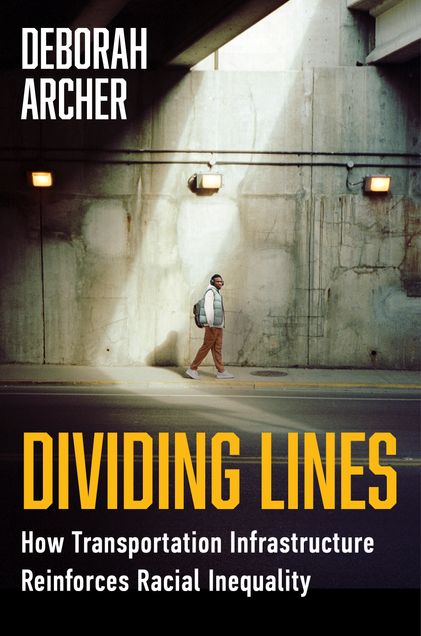Jump To
September 10, 2025
Boston University Scho0l of Law
Barristers Hall, First Floor
1-2pm
*Please note this event has been cancelled and we will look to reschedule in the Spring*
Please join us on Wednesday September 10th, 2025 for a book talk to discuss Dividing Lines | How Transportation Infrastructure Reinforces Racial Inequality with professor Deborah Archer. This book talk will be moderated by Professor Ngozi Okidegbe.
Lunch available starting at 12:30pm.
About Deborah Archer
Deborah Archer is the President of the ACLU, the first person of color to serve in that role in the organization’s history, and a nationally recognized expert on civil liberties, civil rights, and racial justice. She is also the Margaret B. Hoppin Professor of Law and Faculty Director of the Community Equity Initiative at New York University School of Law. Deborah is an award-winning teacher and legal scholar whose articles have appeared in leading law reviews and national publications, and she has offered commentary for national and international media. Prior to fulltime teaching, Deborah worked as an attorney with the ACLU and the NAACP Legal Defense and Educational Fund, Inc., where she litigated in the areas of voting rights, employment discrimination, educational equity, and school desegregation. Deborah also previously served as Chair of the New York City Civilian Complaint Review Board, the nation’s oldest and largest police oversight agency.
Recent recognition of Deborah’s contributions to civil rights and racial justice advocacy and scholarship include elections to the American Academy of Arts and Sciences and the American Law Institute; the Smith College Medal, the highest honor Smith College awards to an alum; the National NAACP William Robert Ming Advocacy Award; the Arabella Mansfield Award from the National Association of Women Lawyers; and an Honorary Doctor of Laws Degree from Seattle University.
Deborah is also the author of the national best-selling book Dividing Lines: How Transportation Infrastructure Reinforces Racial Inequality.
About Dividing Lines: How Transportation Infrastructure Reinforces Racial Inequality
Our nation’s transportation system is crumbling: highways are collapsing, roads are pockmarked, and commuter trains are unreliable. But as acclaimed scholar and ACLU president Deborah Archer warns in Dividing Lines, before we can think about rebuilding and repairing, we must consider the role race has played in transportation infrastructure, from the early twentieth century and into the present day.
As Archer demonstrates, the success of the Civil Rights movement and the fall of Jim Crow in the 1960s did not mean the end of segregation. The status quo would not be so easily dismantled. With state-sanctioned racism no longer legal, officials across the country—not just in the South—turned to transportation infrastructure to keep Americans divided. A wealthy white neighborhood could no longer be “protected” by racial covenants and segregated shops, but a multilane road, with no pedestrian crossings, could be built along its border to make it difficult for people from a lower-income community to visit. Highways could not be routed through Black neighborhoods based on the race of their residents, but those neighborhoods’ lower property values—a legacy of racial exclusion—could justify their destruction. A new suburb could not be for “whites only,” but planners could refuse to extend sidewalks from Black communities into white ones.
Drawing on a wealth of sources, including interviews with people who now live in the shadow of highways and other major infrastructure projects, Archer presents a sweeping, national account—from Atlanta and Houston to Indianapolis and New York City—of our persistent divisions. With immense authority, she examines the limits of current Civil Rights laws, which can be used against overtly racist officials but are less effective in addressing deeper, more enduring, structural challenges. But Archer remains hopeful, and in the final count describes what a just system would look like and how we can achieve it.
Boston University strives to be accessible, inclusive, and diverse in our facilities, programming, and academic offerings. Your experience at this event is important to us. If you have a disability (including but not limited to learning or attention, mental health, concussion, vision, mobility, hearing, physical, or other health related disability); require communication access services for the deaf or hard of hearing; or believe that you require a reasonable accommodation for another reason, please contact Laura Kirchner (lawevent@bu.edu). Please note that the Office of Disability Services requests a 10-day notice to provide services.

Speakers
Connect with law
How to engage with us on social media:
- Follow @BU_Law and tag us in your stories and posts on all platforms
- Post, like, and retweet content, using event hashtag and tagging speaker(s)
- Share event information on social media
- Send registration link to your networks